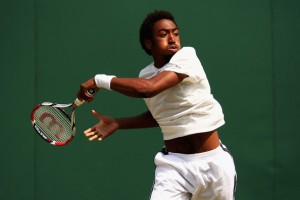NEW YORK – Evan King wanted to have a little fun this summer. You know, hanging out with friends, playing a little ball.
His romp in the gusty wind ended under mostly cloudy skies Thursday, but even then it was special.
“I loved it,” King said after losing a third-round US Open Junior Boys match to 10th-seeded Denis Kudla. “They had the radar gun and a challenge system. We played on the second biggest court in tennis.”

Kudla wasn’t so sure about that last statement.
“It’s the biggest second court in tennis,” he corrected.
The all-American affair took place in Louis Armstrong Stadium, for a number of years the Open’s main court. It didn’t matter that most of the 10,103 seats in Louis Armstrong were empty.
King and Kudla, both 18, are playing in their final junior tournament. By the luck of the draw and the strength of their winning their first two matches, the two found a familiar opponent on the other side of the net.
“This was our fourth official match, but fifth that counted,” King said, then rattled off that they played several times in tournaments for 14-year-olds and a Boys 16 event.
“In the Orange Bowl he got me pretty badly,” Kudla remembered.
On Thursday, it was Kudla who came out on top, beating the wind and King 6-7 (7) 7-5 6-4.
King is ready to begin his sophomore year at the University of Michigan. As a freshman he was named Big 10 Conference Rookie of the Year and Intercollegiate Tennis Association (ITA) Midwest Region Rookie of the Year. Because he hasn’t been playing junior events, he didn’t have a junior ranking and was able to enter the US Open event with a wild card.
“My ITF (International Tennis Federation) ranking is 800 or something,” King said. “Last year I beat the number five seed. This year I just wanted to come out here and enjoy.”
Kudla also is planning on post-junior events. He said he was thinking about the Futures circuit, but didn’t know when or where he would begin.
Despite the windy conditions, which have existed for a full week now, the two weren’t nervous about playing on such a big stage. There was a reason, of course.
“Talking this morning took away the nerves,” Kudla said, revealing the two friends chatted in the locker room before taking to the court. “I’m not putting so much pressure on myself as at the other Slams.”
Then there was the wind.
“It’s so windy out there that no one is playing well,” said Kudla, a native of Arlington, Virginia, USA. “You have to play with huge margins of error. I used a lot of spin and a lot of height over the net. He had the same kind of mindset.”
King said it was the first time either had played on a court where the challenge system was in use.
“I probably used it too much,” he said.
Maybe he didn’t.
In the fourth game of the match, King was called for a double-fault. But he challenged call on the second serve and the replay showed that the ball had clipped the outside of the left sideline. The call was changed to an ace, giving him a 40-0 lead.
A forehand volley that was returned into the net closed out the game and pulled the two even at 2.
The next challenge by King, a native of Chicago, Illinois, came on a baseline call on a ball that had been called long. The line judge had been right.
In his next service game, King battled to hold. Twice Kudla had break point as the two exchanged in long baseline rallies, playing it safe by hitting the ball short and down the middle. On the second break point, King hit an 87 mph (140 kph) service winner, pulling back to deuce.
Two netted forehands by Kudla allowed King to hold serve to 3-3.
Kudla took a 4-0 lead in the tiebreak, beginning with his second ace of the day. But his forehand volley went wide on the fifth point as King began his comeback. A netted backhand volley later in the tie-break began King’s four-point run to close out the set, the final point coming when Kudla double-faulted.
Kudla challenged two consecutive points in the fourth game of the second set. On one he was correct; on the other he was not.
The two traded service breaks early in the set, but Kudla again broke King at 15 in the 11th game, and then held at 15 to knot the match at one set apiece. In the third set, Kudla again was the aggressor, taking the net whenever he could to end points with excellent volleying. King was more content to stay back and hit with topspin, hoping to draw errors.
The only service break in the third set came in the seventh game.
Also advancing to the Junior Boys quarterfinals were Filip Horansky of Slovakia, Jiri Vesely of the Czech Republic, Agustin Velotti of Argentina, Victor Baluda of Russia, Marton Fucsovics of Hungary and two Americans, Jack Sock and Dennis Novikov.
Winning third-round Junior Girls matches were Daria Gavrilova and Yulia Putintseva of Russia, Karolina Pliskova of the Czech Republic, Caroline Garcia of France, Ons Jabeur of Tunisia, Monica Pulg of Puerto Rico, and Americans Robin Anderson and Sloane Stephens.
